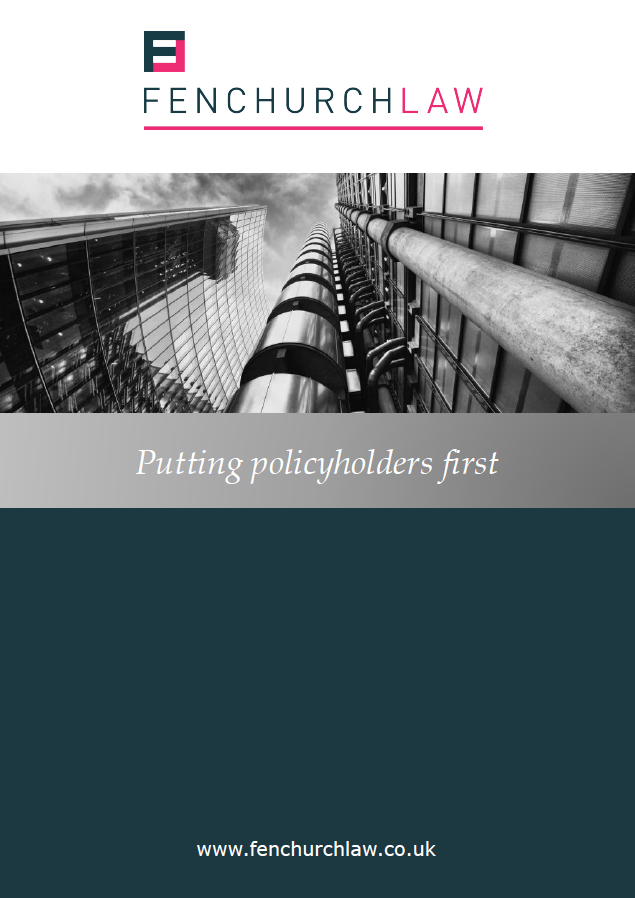
COVID-19 Business Interruption Update: Further details of FCA Test Case
The FCA has now published details of its proposed test case in which it seeks to determine a number of coverage issues common to a majority of declined COVID-19 business interruption claims.
Insurers/Policy Wordings
Following consideration of over 1200 submissions to its preliminary policyholder consultation process, 17 Policy wordings have been selected as a representative sample covering the broadest spread of common issues.
At present the FCA has indicated that 16 insurers have issued policy wordings within the list identified, eight of whom have been invited to participate in the proceedings:
• Arch Insurance (UK) Limited
• Argenta Syndicate Management Limited
• Ecclesiastical Insurance Office plc
• Hiscox Insurance Company Limited
• MS Amlin Underwriting Limited
• QBE UK Ltd
• Royal & Sun Alliance Insurance plc
• Zurich Insurance plc
It is anticipated however that other insurers who have issued policy wordings materially identical will also be affected by the court’s finding, and the FCA intends to issue a comprehensive list of affected insurers in July.
Issues
As anticipated, the focus of the proceedings is on the coverage provided by ‘non-damage’ extensions to business interruption policies, including Non-Damage Denial of Access, Infectious Disease, and Public Authority clauses.
The key issues that have been determined to be common to a majority of disputed COVID-19 BI claims include the following:
• What is meant by ‘interruption or interference’ and is closure required in whole or in part?
• Does “notifiable disease” or “human infectious or human contagious disease” include COVID-19?
• If the disease is required to be in the “vicinity of the insured premises” what does this mean?
• If the policy requires that the disease must exist within a geographical limit of the premises (e.g. 25 miles) what is required by way of proof?
• What is the meaning of an “occurrence” of notifiable disease or an “outbreak” of notifiable disease?
• What does a policyholder have to prove to show prevention or hindrance in access or use of premises?
• What is meant by “actions”, “advice”, “restrictions” imposed by government or other authority?
• What is meant by an “emergency likely to endanger life” (or similar)
• What is meant by “public authority” or “competent local authority”?
• What are the relevant causal links that must be established depending on the words used in the policy?
• Is there more than one potentially operative cause of loss, and if so what is the effect on recovery?
• What effect do any trends clauses have on the application of causation arguments?
• Do micro-organism, pollution or contamination exclusions act to exclude the losses?
Timeframe and Procedure
The FCA intends to file its claim on 9 June 2020, with Defences to be filed by 23 June 2020, and a final hearing is anticipated to be scheduled in the second half of July. In a Framework Agreement executed between the FCA and the participating insurers, it is expressly recognised that the FCA or any Insurer may appeal the decision of the court in relation to any particular issue, but the parties agree to explore the possibility of an expedited leapfrog appeal to the Supreme Court if necessary.
Further Documents
Alongside its announcement, the FCA has published:
• A proposed representative sample of 17 policy wordings;
• A preliminary list of affected insurers;
• Proposed Assumed Facts against which the determination will be made;
• Proposed Questions for Determination by the court arising from insurers’ reason fo declining claims; and
• Proposed Issues Matrix, showing which questions for determination by the court are engaged by each policy in the sample.
• The Framework Agreement agreed by the FCA and Insurers
All documents can be accessed at the FCA website https://www.fca.org.uk/firms/business-interruption-insurance
Consultation
Policyholders, insurance intermediaries, insurers and other stakeholders are invited to provide comments by 3pm on Friday 5 June, to biinsurancetestcase@fca.org.uk
Comment
Taken together, the FCA’s proposed sample of policy wordings, sets of assumed facts, and questions for the court amount to an ambitious and comprehensive set of issues for determination. With eight insurers invited to participate and make submissions across such a broad set of issues in such a compressed timetable, case management will be challenging. Nonetheless, if successfully completed, and not subject to a protracted appeals process, the exercise has the potential to provide insurers, policyholders and intermediaries with a welcome degree of certainty in relation to the vast majority of outstanding COVID-19 business interruption claims. Disputes over discrete issues such as aggregation and quantification of loss will remain, particularly in relation to those policyholders with significant and more complex losses, but even for these policyholders the FCA’s test case should narrow the issues in dispute and reduce the overall costs and time incurred in pursuing claims through formal proceedings.
Other news
Timing is everything – Makin v QBE and the cost of not complying with a condition precedent
3 July 2025
This recent decision from the High Court provides a powerful reminder of the consequences of not complying with a…
You may also be interested in:
Archives
Categories
- Newsletter
- Events
- Webinars
- Comparing German and English Insurance Law – A Series
- Construction Risks
- Operations
- Business Development
- Construction & Property Risks
- News
- International Risks
- Legislation
- Financial & Professional Risks
- Case Law
- Professional Risks
- Press Release
- Uncategorized
- The Good, the Bad and the Ugly
- Fenchurch Law Webinars
- Stonegate



